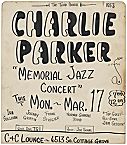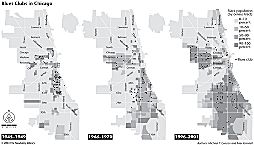| Entries |
| M |
|
Music Clubs
|

|
Jazz was born in New Orleans. Chicago is where the music came of age, with Louis Armstrong's move to the city in 1922, when he joined King Oliver's band at the Lincoln Gardens Cafe, considered a milestone along the historical path of American music. Chicago became the center of black American culture, with jazz flourishing in clubs such as the Plantation and the Sunset, and later in the Grand Terrace and the Club DeLisa. In a variety of locations, Joe Segal's Jazz Showcase has remained one of the oldest jazz clubs in the world.
While the Mississippi Delta is celebrated as the cradle of the blues, the South Side Chicago clubs are where the music transformed itself and sustained its greatest popularity, from the boogie-woogie piano that flourished in the 1920s through the electrified, guitar-powered urban blues of the 1940s and 1950s. From neighborhood taverns such as Pepper's Lounge and Theresa's to “chitlin' circuit” palaces such as the Regal Theater, Chicago nightspots have enjoyed a storied reputation among blues fans.

|
The Encyclopedia of Chicago © 2004 The Newberry Library. All Rights Reserved. Portions are copyrighted by other institutions and individuals. Additional information on copyright and permissions.